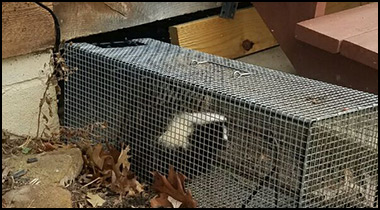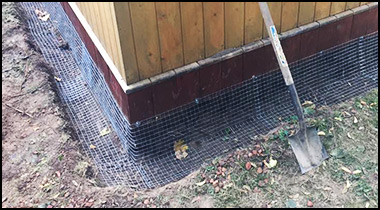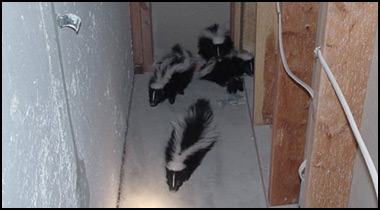Reading Skunk Removal Resources
Skunk Rehabber - Red Creek Wildlife Center: (570) 739-4393
Free Berks County Animal Services: 610-921-2348
Humane Wildlife Trappers of Reading: 570-240-4883
If you need skunk control in Reading, you have a few options. First, you can attempt to solve the skunk problem yourself by reading our do-it-yourself guide. If you need outside help, you can also call Berks County Animal Services to see if they have any free resources or help for you - however, they primarily deal with dog and cat concerns. You can also call a local Reading wildlife rehabber, as they are typically a great resource for advice that is in the best welfare of the animal. If as a last resort you must hire a professional company, we recommend Humane Wildlife Trappers of Reading at 570-240-4883. To learn more about them or check their skunk removal prices, visit readingpestanimal.com.

Reading Skunk Trapping and Removal

Preventative Repairs & Exclusion

Reading Skunk Removal From Structures
In many cases, preventative measures can solve your Reading skunk problem - keep garbage secured, pet food indoors, and most of all when it comes to skunks, secure the perimeter of your shed, porch, deck, or house with a barrier - lattice or steel mesh is good, and it keeps Pennsylvania skunks from going under the structure. If trapping and removal of the skunk is the only option you have, please do so with the help of a local agency or professional company who knows how to do it humanely and legally. Browse the resources of this site for more educational information.
Frequently Asked Questions:
Prevention: How to Keep Skunks Away
What to do with a skunk after I catch it?
Is it legal for me to trap a skunk?
How to remove skunk odor
Is a skunk active during the daytime rabid?
What does skunk feces look like?
Reading Skunk Control Information: What is a skunk's mating habits, when do they have babies, how do they raise their young?
The meeting seasons of skunks stretch from February throughout the ending of March. This means that sometimes during this period residents may observe some well-known smell wafting all around as well as enlarged sightings of skunks' bushy black tails bustle for cover. This is a sign that the skunks are mating. In early February the male skunks begin rolling looking for female skunks for mating, in fact, they can travel more than 10 kilometers during the mating season but on the normal life they can only walk for a kilometer or two.
In the mating season, the females have a habit of producing some aroma to repel their rejected suitors, after the romance, the male skunks will come running, and they will romance and mate. However, their mating period is very short. Later baby skunks will be born. Nevertheless, these young ones will depend on the exact season when the mother skunk was born and harshness of the weather. A minor winter with petite snow on the ground force the male skunks come early February. Centrally very harsher winters can postpone push forward the male skunks. The Yearling female skunks which were born previous year, won't yet be ready to mate until March or April.
Gestation period
The gestation period of a skunk takes between 60 to 75 days. Bay skunks are born in litters of about fifteen kittens. All the kittens which were conceived in the early days of the mating season are born in the first days of May. On the other hand, Kittens born to yearling mothers which get conceived in the course of April are born at the end of June.
After the young ones have been born, the male skunks the do not concentrate much on their young ones; they do not cycle feed or rare their kids. On birth, the young people are always pink with black faint and white traces and tiny fur or without. Also, they are blind from the birth date until they three weeks old at the eight-days the kittens produces some mask which can't allow them to see. This state is critical and gives other parts of its body to grow. When they are eight days old, they cannot spray intruders until they are about three weeks old or more
Remember, for free services you can try (570) 739-4393 or 610-921-2348, but if you need to pay for professional help, check the prices at the readingpestanimal.com website. Or follow our do-it-yourself guide!

